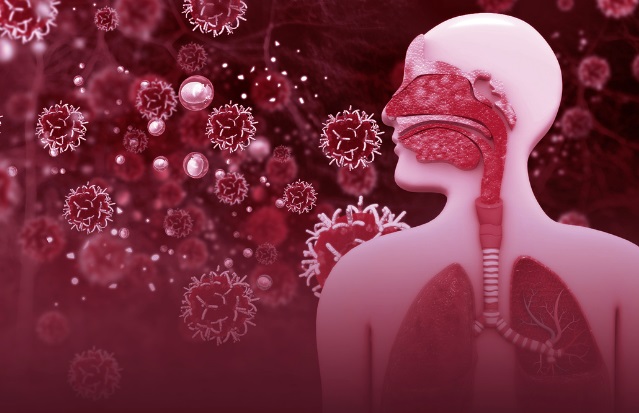Nikhil Prasad Fact checked by:Thailand Medical News Team Apr 07, 2025 3 days, 7 hours, 5 minutes ago
Medical News: Long-Term Organ Damage Found in Survivors of Non-COVID Respiratory Infections
In a shocking new study review by German researchers, it has been revealed that common respiratory infections - excluding COVID-19 - can cause severe and long-term health complications that affect nearly every major organ system in the human body. While much of the world’s attention has been focused on the long-term impacts of COVID-19, this new study has shed light on an even more widespread but overlooked danger.
 Silent Aftermath of Common Respiratory Infections Could Be Worse Than COVID-19
Silent Aftermath of Common Respiratory Infections Could Be Worse Than COVID-19
The researchers behind the study are from the Department of Medicine, Pulmonary and Critical Care Medicine and Clinic for Airway Infections at University Medical Centre Marburg, Philipps-University Marburg; the Institute for Lung Research at the Universities of Giessen and Marburg Lung Center (UGMLC); the German Centre for Lung Research (DZL); the Institute for Lung Health (ILH) in Giessen; the German Centre of Infectious Disease Research; and the Centre for Synthetic Microbiology (Synmikro) at Philipps-University Marburg in Germany.
This
Medical News report dives deep into the alarming findings that suggest infections like influenza, RSV, tuberculosis, and others might silently damage the heart, lungs, brain, and even mental health, years after recovery.
Beyond the Flu and the Cold - An Invisible Epidemic
According to the researchers, acute respiratory infections (ARIs) caused by common bacteria or viruses such as influenza, Streptococcus pneumoniae, and respiratory syncytial virus (RSV) are often followed by dangerous complications that go far beyond the initial illness. These include heart attacks, strokes, lung fibrosis, cognitive decline, chronic fatigue, and even severe mental disorders.
Among the most staggering findings was that up to 35 percent of patients who suffer from community-acquired pneumonia (CAP) may develop cardiovascular complications such as heart attacks, arrhythmias, and heart failure. These issues can appear within the first week after infection and persist for up to a decade.
One study cited by the authors showed that 32 percent of hospitalized pneumonia patients experienced serious heart events during or shortly after hospitalization.
Strokes are another major concern. The risk of a stroke increases dramatically - up to 12 times - within days following certain respiratory infections. Even mild infections like the flu can double the risk of both strokes and heart attacks for up to two weeks.
Devastating Impact on the Lungs and Brain
The damage does not stop at the cardiovascular system. Up to 54 percent of patients were found to have abnormal lung function a year after a respiratory infection. Lung fibrosis, a permanent scarring of the lung tissue, was detected in as many as 62 percent of patients recovering from various viral infections including MERS and influenza subtypes H1N1 and H7N9.
Respiratory infections were al
so strongly associated with lasting neurological and psychiatric issues. More than 60 percent of patients reported anxiety, depression, or PTSD after infections like SARS or MERS. Cognitive impairments such as memory loss, difficulty concentrating, and even dementia were also documented in up to 53 percent of survivors over long-term follow-ups. In fact, hospitalized pneumonia patients had a 2.2 times higher risk of developing dementia later in life.
Shocking Mortality and Societal Burden
The long-term mortality statistics are equally troubling. Even after surviving the initial infection, patients who had pneumonia face a significantly higher chance of dying in the years that follow. The one-year mortality rate was 17 percent compared to just 4 percent in those who never had pneumonia. That number increases to 43 percent after five years and 53 percent after seven years. Many survivors never return to their previous health or employment levels, with 17 percent ending up on disability pensions and 22 percent retiring early due to lingering symptoms.
What Is Causing This Hidden Damage
Scientists believe that a combination of factors are responsible for this multisystem breakdown. Persistent immune activation, mitochondrial damage, autoimmune reactions, and disrupted microbiome balance could all contribute. In many cases, the immune system continues to attack the body even after the virus or bacteria is gone, causing ongoing inflammation and tissue damage.
Conclusion
This groundbreaking study warns that non-COVID respiratory infections are far more dangerous than previously understood. While many people recover quickly from illnesses like the flu or RSV, a significant portion are left with long-lasting health problems that diminish quality of life, increase the risk of early death, and create a heavy burden on healthcare systems and economies. These findings stress the urgent need for better long-term care and monitoring of patients after ARIs, along with more public awareness. Preventive measures like vaccines and early intervention could potentially save lives and avoid years of suffering for millions worldwide.
The study findings were published in the peer reviewed journal: Infection.
https://link.springer.com/article/10.1007/s15010-025-02519-7
For the latest on Respiratory Infections, keep on logging to Thailand
Medical News.
Read Also:
https://www.thailandmedical.news/news/australian-scientists-discover-that-sugarcane-extract-shows-promise-in-fighting-respiratory-viruses
https://www.thailandmedical.news/news/many-are-unaware-that-influenza-infections-also-increase-the-risk-of-stroke-just-like-covid-19
https://www.thailandmedical.news/news/alkylamides-from-echinacea-shows-promising-effects-against-respiratory-viruses
https://www.thailandmedical.news/pages/thailand_doctors_listings
Follow us on:
https://x.com/ThailandMedicaX
https://www.facebook.com/ThailandMedicalNews
https://bsky.app/profile/thailandmedical.bsky.social
https://gettr.com/user/thailandmedicalnews
https://www.tribel.com/thailandmedical/wall
and 33 other social media platforms
